
“Democracy is not something you believe in or a place to hang your hat,
but it’s something you do. You participate. If you stop doing it, democracy crumbles.”
– Activist, writer and speaker Abbie Hoffman
This is the toughest blog for me to write. In fact, I devoted 2023 to blogging and writing about my life story. This was the blog I knew it was vital for me to write, but I dreaded writing this blog. For the past 23 years, I have not felt that environmentalists, climate advocates, progressives and Democratic leaning voters were smart about electing Presidential, state level, and local candidates who would protect our environment, planet, and our democracy.
This is going to be a very painful blog to write, but I feel like I have no choice to share but to share my story. Hopefully, someone can learn from my disappointment and letdown I felt from environmental and climate Democratic voters who allowed awful candidates for President and other elected offices win.
This was such a tough blog to write. I had so much to say that I broke up it into many parts:
Part 1, My 1980s childhood in Missouri to witnessing 2000 Presidential Election in Florida
Part 2, My story as a park ranger and rediscovering Al Gore 2001 to 2007
Part 3, Loss of a friend, Leaving Everglades, and finding my passion for climate action 2007-08
Part 4, Healing from grief and Taking Climate Action in Oregon and Missouri 2009-2016
Part 5: My frustration and heartbreak with the 2016 Presidential Election
Part 6: Donald Trump’s Disgraceful Presidency and my climate action 2017-2020
Part 7: Working as a U.S. Census Enumerator and living through Presidential Election of 2020
My job as a U.S. Census Enumerator in 2020 during the COVID 19 Pandemic
On March 10, 2020, Oregon Governor Kate Brown signed strong executive orders for the state of Oregon to tackle climate change. She did this in response to the Republican walking outs to prevent passage of Renew Oregon’s cap and invest bills in 2019 and at the end of February 2020. I was one of the dozens of climate organizers, including many school age children who were invited, to be inside the Governor’s office to witness her signing those executive orders.
Two weeks later, March 23, 2020, Citizens’ Climate Lobby (CCL) published a blog I wrote about this event, “Oregon Governor Kate Brown signs strong climate executive order.” That always feels like a big accomplishment for me to get an opinion editorial published in a newspaper or a blog published, such as the CCL website. After the release of that blog, I felt like I did not have anything to look forward, including no traveling, no lobbying, no public speaking, no way to meet with friends, no events to organize, etc. I was lucky to have my wife Tanya, and we still went hiking locally together. I just felt so lethargic and no motivation to do anything.
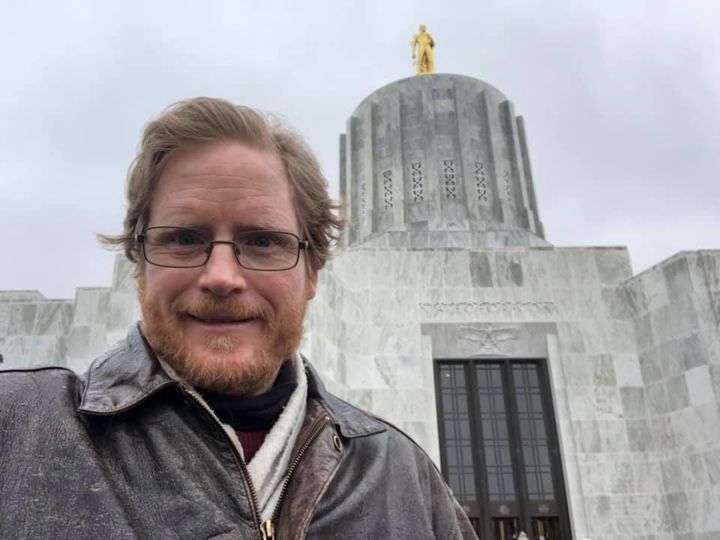
Oddly, Tanya got laid off from her job for about nine weeks because of the pandemic and economic downturn. Financially, we were fine. She threw herself into studying full time for a degree in data management. I was just adrift. I did not feel like reading any books or writing any blogs. My wife is half Danish and I started taking daily Danish lessons from her. In May, I started doing the Duolingo Language Learning App on my phone full time.
In January 2020, a friend encouraged me to apply for the U.S. Census Bureau to help them complete their Census count. I turned in my application that winter. I would hear from the Census Bureau periodically that they wanted to hire me to be an enumerator to help compile data for the 2020 Census. I was so tired of sitting at home. Yet, 2020 highly recommended people to stay home with the very contagious COVID 19 raging at the time.
The U.S. Census Bureau finally hired me and the other Census enumerators in the last week of July 2020. I had to complete a series of trainings at home before I drove to a temporary Census office on July 28th in Damacus, Oregon.
The next week, I started traveling to different houses in Portland to interview residents who did not fill out their Census form. I thought this was the most patriotic job I could do at that moment. The Census dates back the U.S. Constitution enacted in 1789. Article I, Section 2 of the U.S. Constitution empowers Congress to carry out the census in, “Within every subsequent Term of ten Years, such manner as they shall by Law direct.”
According to the U.S. Census Bureau, “The Founders of our fledgling nation had a bold and ambitious plan to empower the people over their new government. The plan was to count every person living in the newly created United States of America, and to use that count to determine representation in the Congress.
Enshrining this invention in our Constitution marked a turning point in world history. Previously censuses had been used mainly to tax or confiscate property or to conscript youth into military service. The genius of the Founders was taking a tool of government and making it a tool of political empowerment for the governed over their government.”
I helped to count American citizens so they could have full representation in our democratic government. During our training, it was emphasized that U.S. Census population statistics determined not just Congressional, state level, or local representation. “The results of the census help determine how hundreds of billions of dollars in federal funding, including grants and support to states, counties and communities are spent every year for the next decade. It helps communities get its fair share for schools, hospitals, roads, and public works.”
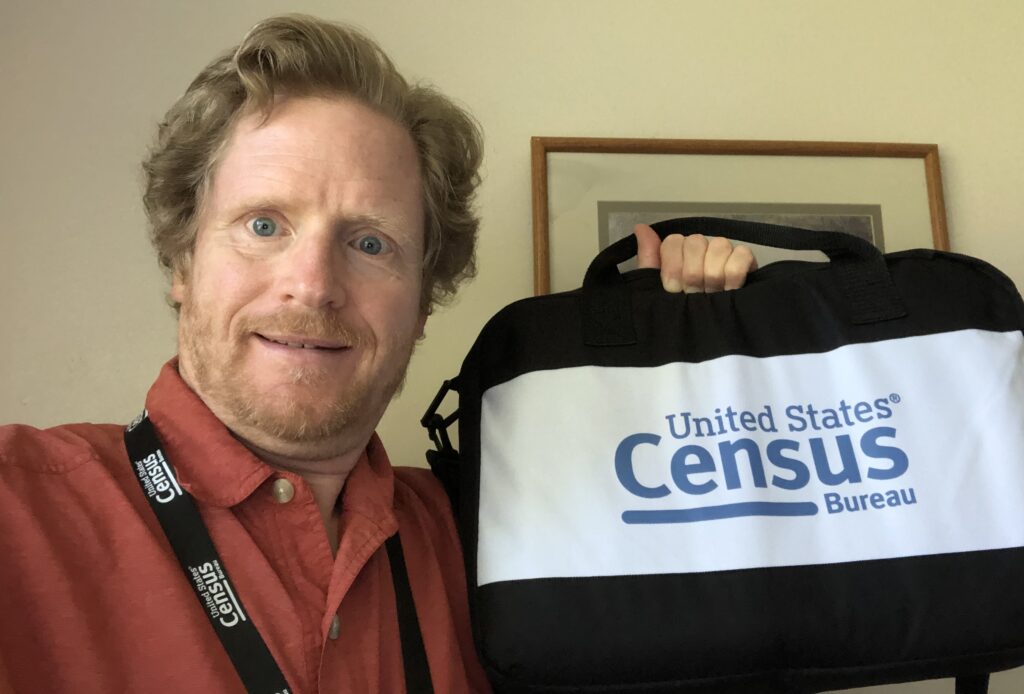
I knocked on the doors of Americans in my nearby community of those who did not fill out their U.S. Census forms to make sure they were fully seen, represented, and were awarded the government services available to them. These services included access to schools, police, fire departments, roads, hospitals, etc. In addition, Oregon expected to gain a 6th Congressional seat from the 2020 U.S. Census count. Oregon barely missed gaining a congressional seat in the 2010 Census. Population studies from that time suggested it was a near lock.
Thus, by working for the U.S. Census and counting people in my community, I could help Oregon gain representation in Congress. Even more, my own neighborhood and the neighborhoods that surround me are some of the most diverse communities of Portland and possibly for all of Oregon. Thus, I was helping my community to be seen and fully represented.
Sadly, President Donald Trump attempted to order the U.S. Census Bureau to exclude undocumented immigrants from key census count. He wanted to shut out undocumented immigrants from having fair representative in Congress and for government services. He demanded a citizenship question added the 2020 U.S. Census, but the Supreme Court blocked it. Trump then threatened to defy a Supreme Court ruling that blocked it, but then decided against it.
Trump hoped a citizenship question or even the rumor of a citizenship question would discourage communities of color and undocumented immigrants from participating in the 2020 U.S. Census. In fact, President Trump and his Administration went to the Supreme Court to attempt to stop the U.S. Census Count in September 2020. Civil rights groups argued minorities and others in hard-to-count communities would be missed if the counting ended in September instead of October. Reading and hearing about this situation in the news motivated me further to count as many people as I could in the Census, especially people of color.
I enjoyed working in this job where I got to be outside engaging with people to try to conduct the most accurate Census count possible. I met some very kind and helpful people. On the other hand, I encountered incredibly rude people did not want to be helpful. They yelled at me for coming to their door. Some even threatened me with a gun.
Part of me was fine if belligerent white conservative folks did not want to be counted in the U.S. Census. Plenty of them were already counted in the Census. It was disheartening when I encountered African Americans, Latino, Hispanic, Asian and other people of color who refused to talk with me. Sometimes I wondered if the U.S. Census Bureau would have had more success if a person of color approached them instead.
Because some people could be so mean, rude, nasty, bitter, and refusing to help me, it made it hard to go to work some days. I had days when I could not wait for this temporary job to be over. I often came home totally deflated worried about America’s future if so many people did not want to participate in the Census, our democracy, and spurned my attempts to chat with them. I consider myself a friendly guy who loves people and wants the best for everyone. I felt depressed when some people acted negatively to me when I was just doing my job. I cared enough about them that I wanted them to be counted on the Census, but they did not care.
This was the flip side to when I worked as a park ranger at Crater Lake and Everglades National Parks for 25 years. I encountered so many park visitors who seemed to love me. They were enamored with the ranger uniform. They wanted their pictures with me. I was as popular as Mickey Mouse at Disney World. I knew it was because these park visitors were excited to be on vacation in a national park and they loved seeing park rangers. It was not me that they loved, it was the uniform. Still, my park ranger years were a very heady experience.
When I was a park ranger, it was a fun part of my job to go to work each day to experience complete strangers that were so thrilled to see me. This U.S. Census Enumerator job felt like the opposite of that. Some of these same individuals who hated seeing me come to their door would have been so excited to encounter me as a ranger in a national park.
As the old saying goes attributed to Mark Twain and Shakespeare, “Clothes make the man.”

I wrote about my U.S. Census Enumerator experience on Facebook on October 13, 2020. Friends gave me many supportive and positive comments. They encouraged me to publish what I wrote. Thus, I wrote an essay for Medium, “Thoughts from a recent 2020 U.S. Census worker.”
The Census Enumerator was a temporary job, so I had to figure out what I was going to do next. Up until the Presidential election on November 3, 2020, I spent that autumn supporting Oregon Democratic candidates. One thing I learned over the previous 20 years is that we can’t pass climate polices on the national, state or local level without electing Democrats.
Helping elect OR Democratic 2020 candidates while threats emerged about Donald Trump not accepting election results.
On September 10th, while I still worked for the U.S. Census Bureau but on my spare time, I organized a Zoom House Party for my friend Chris Gorsek who ran for the Oregon Senate for District 25. In addition, I volunteered for phone bank shifts to urge voters in his Gresham District to support him. I was eager to knock on doors to canvas for Chris, but he and other Democratic candidates were not allowing that due to the COVID-19 pandemic.
On October 25th, I co-organized a house party for Shemia Fagan, who was the Democratic candidate running for Secretary of State. I knew Shemia well since she served as my Oregon Senator at that time. She was very helpful with all my climate organizing. It was important for me that she won the election because in 2021 she would potentially have the final say over redistricting efforts after the 2020 Census statistics were released for Oregon.
It was very exciting on November 3rd that Chris Gorsek and Shemia Fagan won their elections. It felt great to have played a small role in that.
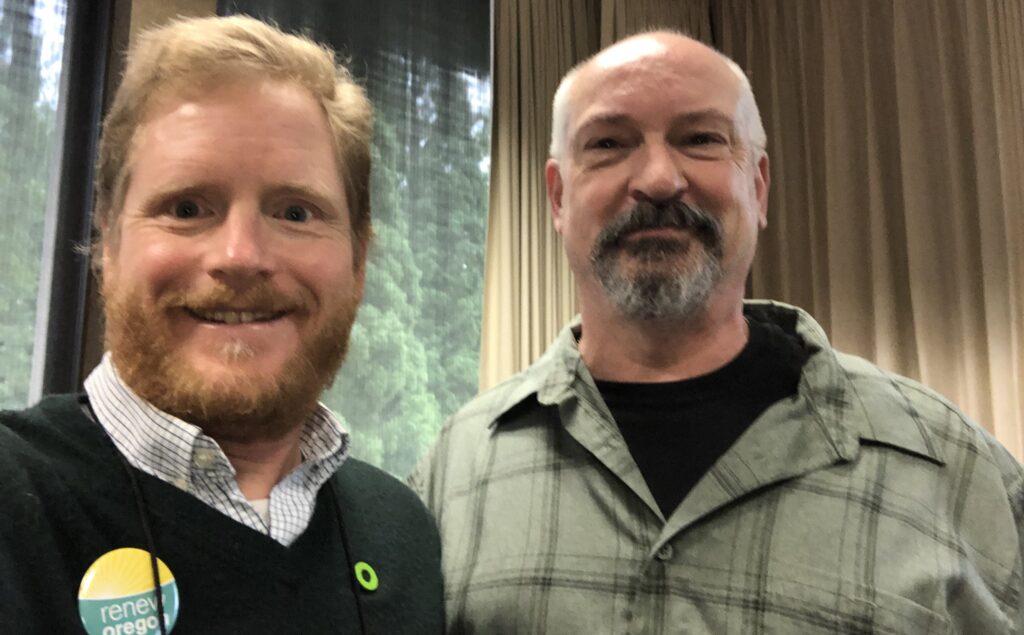
As I volunteered at home to support Oregon Democratic candidates due to the pandemic, articles popped up that Donald Trump may not accept the November 3rd election results. One of the first articles I noticed was “THE ELECTION THAT COULD BREAK AMERICA” by Barton Gellman in The Atlantic on September 23, 2020. The sub headline was “If the vote is close, Donald Trump could easily throw the election into chaos and subvert the result. Who will stop him?”
Two days later, “‘Everyone sees the train wreck coming’: Trump reveals his November endgame” by David Siders and Holly Otterbein in Politico on September 25, 2020. The sub headline: “After more than four years of nonstop voter fraud claims and insinuations that he might not accept the election results, the president isn’t keeping his intent a secret.”
I found these articles to be very alarming and sobering. Yet, they were not surprising because Donald Trump had said for years that he would only accept the election results if he won.
I spoke out on social media after I read these articles. Responding to the Politico piece, I wrote on Facebook on September 25th, “Former Vice-President Al Gore said it best years ago: ‘In order to fix the #ClimateCrisis, we must first fix the democracy crisis (in America).’ Looks like Trump is going to use every despicable tactic possible to stay in power. Therefore, we must be ready to respond. We must vote early if possible and demand that our votes are counted. We must do all we can to ensure this is a free and election, every vote is counted, the results are legitimate, and the losing candidate concedes. Now is the time for fortitude and steel determination, not pessimism, cynicism, nihilism, or feeling defeated. That is what the other side is counting on you to do: give up and not fight back.”
After The Atlantic article, I posted two days later: “Very important article to read and share with the upcoming November U.S. election. The survival of American democracy is under threat. It’s time to face a reality that America has a President struggling with mental issues. He has never been held accountable or learned how to suffer defeat in his life and he is unable to fathom this now. Rather than face a possible loss of power and prestige, he is willing to destroy American democracy just to stay in power. In November, we must steel ourselves to vote, vote in large numbers, and fight to make sure that every vote is counted and the true will of the people is respected.”
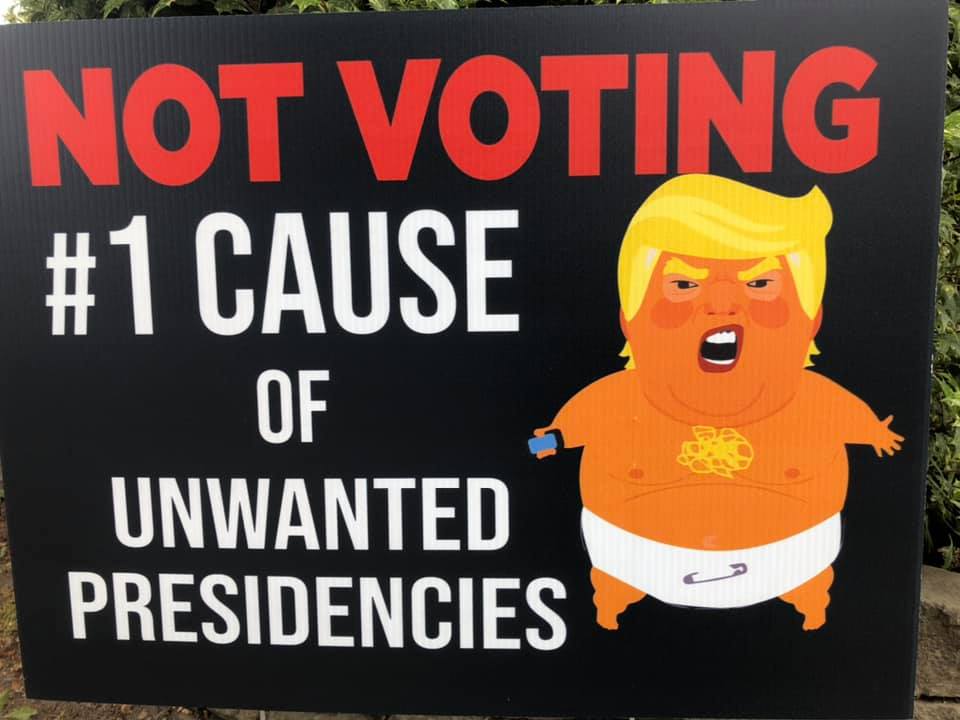
Celebrating November 3, 2020 election while concerned with Donald Trump’s reaction
The Presidential election results looked hopeful for Joe Biden on the evening of Tuesday, November 3rd. However, it was very frightening late at night when President Trump announced to his supporters at the White House, “This is a fraud on the American public. This is an embarrassment to our country. We were going to win this election. Frankly, we did win this election.”
Trump’s response was unhinged and troublesome, to say the least. I never heard a President or major Presidential candidate speak like that before in my life or in American history. It seemed like the U.S. was in uncharted territory for a President not to accept the results of an election. I was hopeful. Yet, I had a bad feeling it was going to be a rocky transition since Trump did not want to give up on the reins of power. He was going to do all he could to declare the election illegitimate to try to remain as President. Not good.
The next day, November 4, 2020, Barton Gellman, The Atlantic writer who sounded the alarm for months that Trump would not give up the Presidency, was interviewed on NPR’s Fresh Air prorgam by host Terry Gross. The interview was titled, “’Atlantic’ Writer Says Current Election Is A ‘Stress Test’ Of American Democracy.”
It was a huge relief for Tanya and me, as well as millions of other Americans, when the news media declared that Joe Biden won the Presidency on Saturday, November 7th. Pennsylvania was the “Keystone State” that helped Biden cross the threshold of 270 Electoral College votes. We were so excited with the results that Pennsylvania tipped the election in Biden’s favor.
To celebrate Biden’s victory, we drove to a local Portland food cart to order Philly cheese steak sandwiches. We ate them for a late lunch that day. Unfortunately, they tasted terrible. Maybe they taste better in Philadelphia. However, these sandwiches felt like a rock in our stomachs. We did not feel fine for the rest of the day. If Pennsylvania plays a crucial role in a future U.S. election win, we know next time to buy Philly cheesecakes, not Philly cheesesteaks!
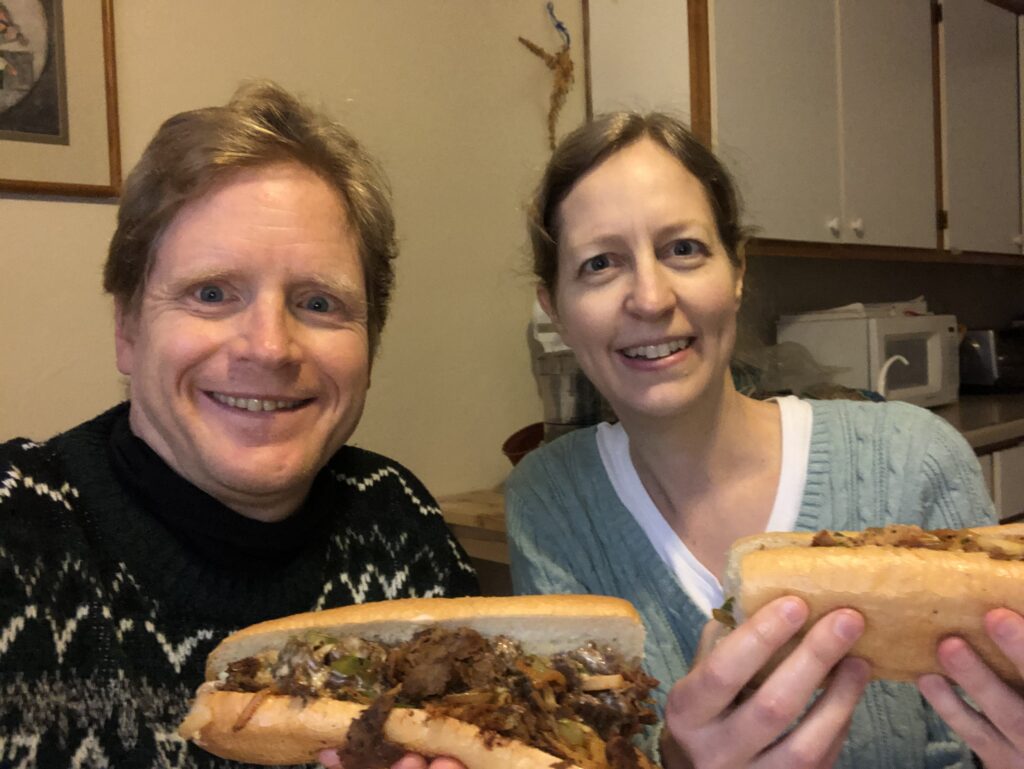
It felt rather odd that former Republican President George W. Bush was one of the first calls that President-elect Joe Biden received congratulating him on his victory. That was a lovely gesture. Sadly, President Donald Trump refused to accept election results, said it’s ‘far from over.’
My November 2020 appearance on the TV show Comedy Central’s Tosh.o
On a lighter note, as we waited to see if Donald Trump would concede, Comedy Central’s Tosh.o TV show invited me to return to the show for another taping. They wanted to quickly put together an episode to get my comments and other past guests on the recent Presidential election. Unlike the previous episode, they were going to film me over Zoom. With the pandemic, they were not going to fly me to Los Angeles like they did in 2016.
In August, Comedy Central announced it would end its run with November 24, 2020 as the series finale for Tosh.o. ViacomCBS-owned cable network stated Tosh.o would wrap its run with its 12th and final season in the fall of 2020. The last 10 episodes would air starting on September 15th. Thus, I had a chance to return to the show for one last time on one of the last remaining episodes to be aired on Comedy Central.
This TV comedy show could be a great platform to discuss climate change. I wanted to slip in a message to urge for climate action if possible. With the pandemic, I had not given a climate change presentation in months, and I felt very rusty. Thus, I emailed climate scientist Dr. Michael E. Mann of University of Pennsylvania for his advice for climate change messaging for this TV appearance, and this was his response:
“Hi Brian…
Sounds like a great opportunity indeed. These days, my messaging is focused on just two words: urgency and agency.
Yes, bad things are happening, we can see them playing out in real time now. But we can prevent the worst from happening. Assuming the election goes our way, there will be leader ship once again in Washington DC. And we have ready climate plans on the table from both Congressional Democrats and the Biden campaign. We need to hit the ground running, and in his perspective first hundred days, Biden and a hopefully Democratic Congress need to pass a climate plan that put a price on carbon, incentivizes clean energy, enforces regulations, and blocks support for new fossil fuel infrastructure.
That’s sort of my elevator pitch!“
Sadly, this 2020 Tosh.o segment was not as good as the original episode where I was a guest in 2016. I was disappointed that I was unable to squeeze in a message about climate change for my second appearance. My first guest appearance on Daniel Tosh’s show focused exclusively on my climate change messaging and my attempts to use comedy. This time, climate change was hardly mentioned. Still, it was fun to participate on this TV show again. The segment was called, “DANDERSON COOPER 361.”
2020 was a depressing year for me with the COVID 19 pandemic. This Tosh.o appearance was a welcome comic relief for me. When I posted about it on Facebook, my friends and family seemed to enjoy watching me again on TV. As far as my climate organizing, I made good connections with Oregon Legislators in 2019 and 2020 when I lobbied for the cap and invest bills. This led to new climate organizing effort in 2021. I will cover this in the next blog as well as my thoughts on the serious threat to American democracy.
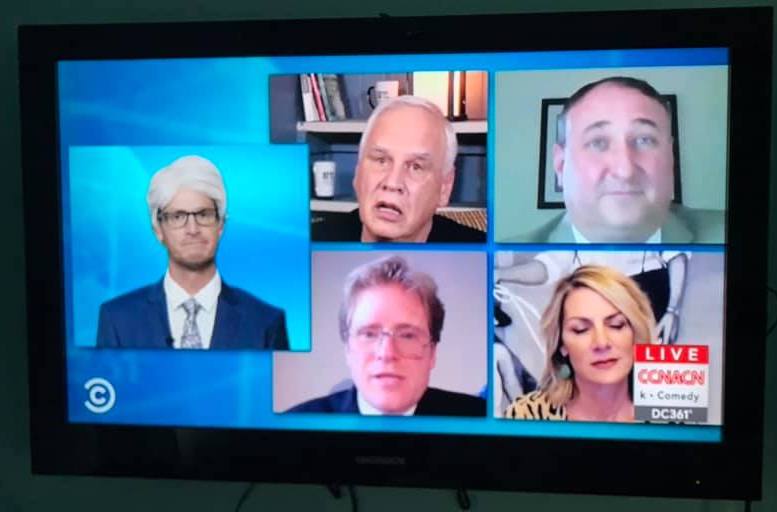
Stay tuned for Part 8, the aftermath of the 2020 Presidential Election: U.S. democracy under attack 2021-2023.
